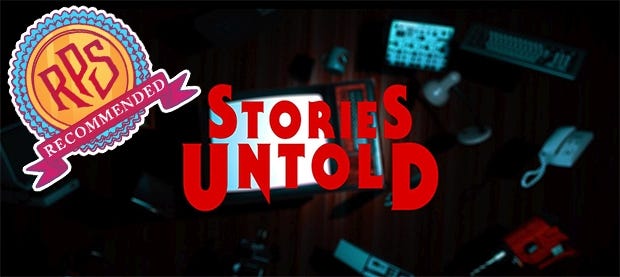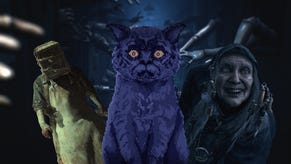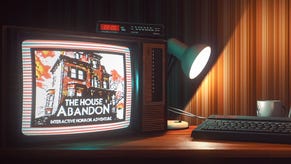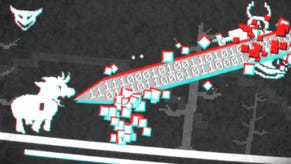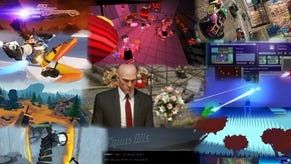Wot I Think: Stories Untold
> look red X
Gosh, we’re living in brilliant times for interesting games. It seems barely a month goes by now without something novel and fascinating appearing, pushing at the edges, upcycling old ideas for new minds, and messing with our brains. The latest that fits all these categories is the really very splendid Stories Untold [entirely pointless official site], ostensibly a collection of four novella-like adventures linked by an opaque theme. It’s part parser-based text adventure, part horror peculiarity, part 80s TV show... It’s unlike anything you’ve played before, despite being built from the half-remembered remains of a childhood of gaming.
So a familiar caveat to accompany such a review: if you trust me, if you want to experience the game with as little information as possible so everything’s a surprise, then take the above paragraph as everything you need and spend £6 on this. If you want more details (wonderfully written and spoiler-free), then read on.
The game’s store information is deliberately vague. The game’s website is blank to the point of apparently forgetting that they’ve released it. You’re meant to go into this blind. So I’ll give you the setup, then move on to the criticism.
It says on Steam,
“Stories Untold is a compilation tape of four experimental text adventures, including a remaster of the original episode The House Abandon.”
Even that isn't quite true.
As you begin you’ve four chapters in a row on a title screen, only the first available to play. Each unlocks as you complete the last. And the first is The House Abandon, a parser-based text adventure (or “piece of interactive fiction” if you’re cool), a previously released project that has been updated for this compilation. Start it, and rather pleasingly instead of simply being presented with a screen of text, you’re presented with a screen, keyboard, lamp and desk. Type on your keyboard, text appears on that in-game monitor, and perhaps in the most superfluous sound effect in gaming history, it makes keyboard noises to match. (I WAS ALREADY MAKING KEYBOARD NOISES, GAME.)
Then you know what to do. You’re outside a house, in your car, there’s a glovebox.
> OPEN GLOVEBOX
There’s a note and some keys. You take them.
> LEAVE CAR
And so on. You’re returning to your family home after some time away (I’m not sure if the Gone Home similarity there is deliberate, but if it is, it’s not important), you need to get the power on, get inside, start looking around. Until stuff starts happening. Interesting stuff.
The second chapter’s short game changes things rather. You’re performing experiments in a dark laboratory, following instructions on a green monochrome monitor, fiddling with hardy old machinery to conduct peculiar tests. The third sticks with the themes of monitors and following instructions, but this time in a completely different setting, with some more involved interpretation of codes. The fourth is yet again a new location, a new approach. They’re linked, but exactly how is vague, and trying to draw lines between them is an interesting aside as you’re drawn into each unique narrative.
There are some issues along the way. When you’re using the parser interfaces there are a lot of expected basics that aren’t in place. It doesn’t seem to know basic IF commands, like “look” on its own for describing the current area, or “i” or even “inventory” for finding out what you’re holding. All IF games have frustration when they don’t recognise a term, especially when you’re using the same wording in the description, and there’s definitely too much of that here. A bit more work on guessing how a player might phrase something would improve the flow of things. And there are a fair few typos throughout, not all of which I believe are deliberate.
More infuriatingly, it insists on ‘teletyping’ out the text for each location even when you’re revisiting, and won’t let you type until it’s done. That’s a very odd design choice, especially when it insists on re-describing the current location if you, say, read a note. Just let me type already! And perhaps most problematic, at a certain point in the first chapter, you can only continue by entering a specific phrase which it prompted you to enter a screen or two back. Enter the phrase incorrectly and the response only tells you again to enter it, rather than reminding you what it is it demands you say. Slight variations on the phrase it wants aren’t accepted, which leads to a frustrating time of trying to remember the exact wording that appeared on screen once, and can’t be brought back.
My other issue is that, well, damn - I can’t really say. There are lighting problems in the third section, let’s leave it at that. Ooh, I hope that complaint has the side-effect of being intriguing.
But back to celebrating this, because flipping heck, it’s good. It’s good because of what you’re not expecting, and if you’re annoyed that you’re now expecting something when you weren’t before, you should have trusted the second paragraph in this review. When will you learn? It’s good for all the reasons I can’t say, or I’d make them less good for you.
There are so many lovely details, not least the splendid opening titles sequence for each of the four segments, reminiscent of many an ‘80s TV show, with a Stranger Things-like title card to boot. There are indeed many details you won’t even know are lovely details. Ooh, it’s a bit clever.
(Slightly connected to that, it’s important to add a quick health warning. (For real, no gag.) Pretty much all games come with an epilepsy warning, covering their backs for those just-in-cases, which I suspect means even epileptics might have developed a habit of ignoring them. So it’s worth emphasising that Stories Untold’s epilepsy warning is for real - there’s a prolonged sequence in the game that has multiple rapidly strobing lights that isn’t to be messed around with if you’re at risk.)
This is smartly written, intriguingly delivered, and wonderfully unique. It’s fascinating that in the same month we've got two such wildly different interpretations of interactive fiction, with Night In The Woods combining the genre with platforming and bright cartoon graphics, and Stories Untold pulling it toward something equally visual, but dark, grimy, and frightening. These are splendid times to be gaming!
Stories Untold is bleak and disturbing, novel and experimental, and most importantly when doing all that, very clever. It’s smarter than you’ll realise, in fact. And why it's smart is all in the experience of playing, not to be given away in the process of reviewing. A pain in the arse for me, but worth it for you.
Stories Untold is out now for Windows via Steam for £6/$8.50/€8.50.
